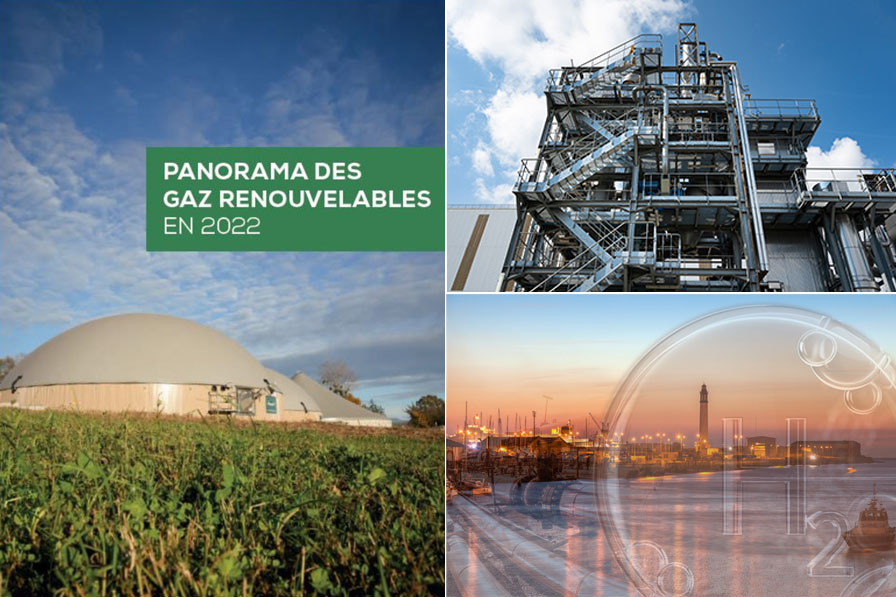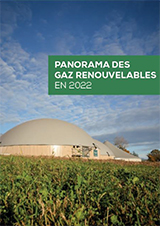2022 Renewable Gas Overview

The Syndicat des énergies renouvelables (Renewable Energies Union) and gas transmission system operators GRDF, GRTgaz, the SPEGNN and Teréga have just published the 2022 edition of the Renewable Gas Overview. This eighth edition comes during a year that has seen a major energy crisis, confirming the strategic importance of producing renewable gas nationally.
The boom in methanisation that got underway last year has continued, and the sector has real potential. Nevertheless, the current economic framework is preventing projects from emerging – even though they are vital for France's energy independence and for decarbonising the economy. Our aim of having renewable gas account for 20% of the energy mix by 2030 is within reach – provided powerful measures are quickly implemented by the state authorities in order to prevent the abrupt slow-down which has already started across a dynamic sector – one which is a source of numerous environmental and societal benefits.
Jules Nyssen, chairman of the Renewable Energies Union said: “The renewable gas production sectors are a major lever for decarbonising the French energy system and ensuring its resilience. But the economic and regulatory framework is currently preventing the sector from developing. And yet, it is essential in all of our energy transition scenarios. Although it was buoyant until 2022, it would be ludicrous to do without renewable gas in the current context – gas which is produced in France and which already has a safe and robust network for transporting it".
Methanisation – the multiannual energy programme target for 2023 exceeded more than a year ahead of time
In 2022, for the second year in a row, nearly 150 biomethane production sites were brought into service. There are now more than 500 of them, representing a total of 9 TWh/year of injection capacity as of the end of the year. In less than three years, the production capacity of the biomethane sector has overtaken that of a nuclear reactor1. Methanisation for injection is the only French renewable energy sector that is currently ahead of the targets set in the multiannual energy programme: by the end of 2023, production capacity will have reached 6 TWh. However, these positive results should not detract attention away from the brutal slowdown that these sectors will suffer starting in 2024. Indeed, since the changes to the economic framework that got underway at the end of 2020, the number of new projects has scarcely managed to offset the numbers that have been abandoned in the queue. To give impetus back to the sector, renewable gas requires a stable economic and regulatory framework – one that is secure over the long term.
1Over the last three years, the production capacity of the biomethane sector has reached 6.5TWh, overtaking that of a nuclear reactor (5.5 TWh/year). Hypotheses used: availability rate of a methanisation site: 90%; availability rate of a nuclear reactor: 70%, reactor power: 900 M.
Unless immediate decisions are taken and without clearly visible support mechanisms, the impetus will cease in 2024
Despite the initial regulatory measures that were favourably received by the sector in 2022 to tackle the combined effects of the pandemic and inflation, the sector’s future gives us cause for concern. The operational implementation of the extrabudgetary Biogas Production Certificate scheme is now a priority. We are awaiting the implementing law to set a meaningful pathway for incorporating renewable gas into suppliers' portfolios – starting in the first few years of it coming into force. The current inflationary landscape, which is preventing a number of projects from getting off the ground, also needs to be properly factored into the next review of the biomethane purchase tariff. Methanisation projects – like renewable electricity projects – need to be able to take advantage of the guarantee fund covering any litigation that was established by the recent law on speeding up the development of renewable energies.
Financing innovative renewable gas production sectors – a key challenge
This law brought in to speed up development of renewable energies provides access to gas infrastructure for all renewable and low-carbon gas (biomethane, synthetic methane, etc.), regardless of how it was produced. Nearly 70 projects have already been identified which are ready for launch in order to develop innovative technologies, such as power to gas, pyrogasification and hydrothermal gasification, which supplement methanisation. Quickly implementing calls for projects funded via the trial contract scheme will also help support their development. These technologies are already operational in Europe (Sweden, the Netherlands, UK), and in France, the first synthetic methane was injected into the distribution network in 2022. This means that these technologies are now mature enough to be deployed.
Publications
